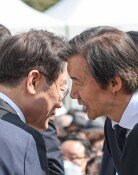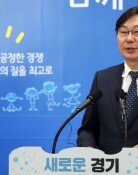A Controversial Correction of History
A Controversial Correction of History
Posted February. 09, 2006 04:30,
After many complications and delays, the book: A New Perception on the History of Liberation was released on February 8. The book was written to correct biased interpretations of modern history and what is known as an overly leftist outlook on history.
This outlook was perpetuated by the book: Understanding History Before and After Liberation, which greatly influenced perceptions of Korean society, especially among members of the current government and the so-called 386 Generation.
A New Perception on the History of Liberation emphasizes the complexities in understanding Koreas modern history and criticizes the dichotomic approach to liberation shown in Understanding the History Before and After Liberation.
European history professor Park Ji-hyang and economics professor Lee Young-hoon of Seoul National University, Korean literature professor Kim Chul of Yonsei, and political science professor Kim Il-young from Sung Kyun Kwan University edited the newly released book. The book contains 28 thesis papers from both at home and abroad, and includes conversations among editors on how to overcome the problematic mindset of national supremacism and the belief in the necessity of the peoples revolution portrayed in the previous book on the subject, Understanding the History Before and After Liberation.
Professor Park Ji-hyang wrote in the preface that after she heard President Roh Moo-hyun express how reading Understanding History Before and After Liberation had angered him, she felt that leaving our societys historic understanding the way it is would be a dereliction of duty for historians, and added that she hopes A New Perception on the History of Liberation helps correct the widespread distorted understanding of our history.
A New Perception on the History of Liberation is made up of two books. The first book deals with life in Korea during Japanese colonial rule and with the issue of Korean pro-Japanese activities (15 thesis papers, 780 pages). The second deals with the division after Liberation, the effects of the Korean War, and an evaluation of the Lee Seung-man administration (13 thesis papers and conversation among editors, 696 pages).
Writers include political science professor Woo Jung-eun of Michigan University, who is the wife of historian Bruce Cumings, a professor emeritus of Chicago University and who greatly influenced Understanding History Before and After Liberation; professor Lee Wan-beom of the Academy of Korean Studies, who took part in writing Understanding History Before and After Liberation; and professor Shin Hyung-gi of Yonsei University.
In addition to the content of the book, the process of planning and printing A New Perception on the History of Liberation itself shows our educated society is not free from doctrinal bias.
From the beginning, the editors of this book decided to choose only writings that have no political color and that have been objectively acknowledged for their academic value in order to correct the unbalanced historic perceptions in Understanding History Before and After Liberation.
Many scholars avoided contributing to A New Perception on the History of Liberation, however.
Professor Park Ji-hyang says in an editors conversation that the editors tried to include a number of great thesis papers in the book, but that the authors refused because they were afraid of domestic backlash. She adds that Korea is still a place where studies exploring the truth are threatened.
Recently, one media outlet released an article calling A New Perception on the History of Liberation the New Rights version of Understanding History Before and After Liberation. This runs contrary to the aim of A New Perception on the History of Liberation that historical studies should never be used as tools for specific ideologies or achieving certain political purposes. The article drew complaints from the writers, and they refused to talk to the media until the final print of the book went to press.
The fact that an overwhelming leftist perception regarding modern history exists in intellectual circles can be seen from the process of the books release. The book was the talk of the academic and publishing industry after Dong-A Ilbo published news of the book in November 2004. Since then, the book has been boycotted twice by its original publishers. And early last year, a publisher that had agreed to print the book later refused, stating that the books political color was too defined and thus not in accordance with the publishing companys standards. Another publisher signed a publishing contract but withdrew suddenly just 15 days before the promised publication date.
A related official from another major publisher that gave up on publishing the book due to opposition from some editors said, It was a very rare thing, but some editors spoke out against publishing the book, saying they did not agree with its historical interpretations. In publishing circles, rumors circulated that publishing companies refused to print the book because they believed the writers were too nationalistic and believed in unifications importance over all else.
Chae-Hyun Kwon confetti@donga.com







